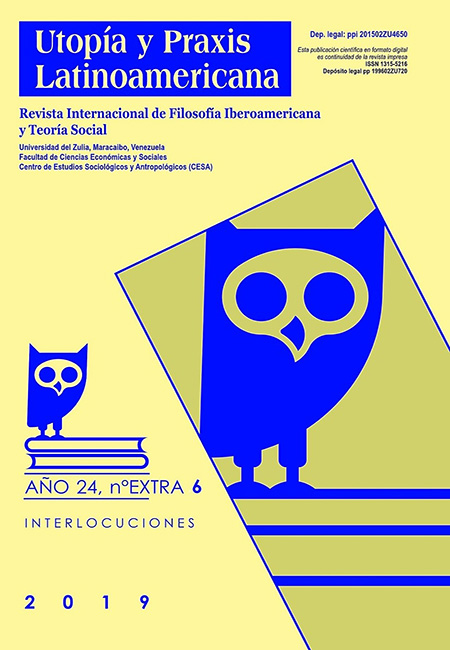Succession of King Hamengku Buwono X Ngayogykarta
Resumen
ABSTRACT
King is God's representative who does not submit to the king of the same as opposing God's will. In a king, the soul is saved on integrity and truth emit because a king can absorb supernatural forces in himself. The Javanese enthroned king was basically one who could not be entered by people from outside the Keraton. The Javanese concept said political power is not something that can be contested. Political power is something that is passed down and is come directly from the revelation of the Almighty.
RESUMEN
El rey es el representante de Dios que no se somete al rey de la misma manera que oponerse a la voluntad de Dios. En un rey el alma se salva en integridad y la verdad se emite, porque un rey puede absorber fuerzas sobrenaturales en sí mismo. El rey entronizado de Java era básicamente a quien no podía entrar gente de fuera del Keraton. El concepto javanés dice que el poder político no es algo que pueda ser disputado. El poder político es algo que se transmite y proviene directamente de la revelación del Todopoderoso.
Citas
ALAM, AS, & YUDHOYONO, WS (2018). Analysis of Java Leadership in Province of Regional Regions Yogyakarta.
FARID, MRAA (2018). “Polemik Sultan Perempuan di Yogyakarta”. An-Nawa: Jurnal Studi Islam, 1(2), pp. 84-98.
KALOGEROPOULOS, P, RUSSO, JA, SULLIVAN, P, KLOOGER, M, & GUNNINGHAM, S (2020). “Re-enfranchising Mathematically-alienated Students: Teacher and Tutor Perceptions of the Getting Ready in Numeracy (G.R.I.N.) Program”. International Electronic Journal of Mathematics Education, 15(1).
LAUREANO, RMS, FERNANDES, AL, HASSAMO, S, & ALTURAS, B (2018). “Facebook Satisfaction and Its Impacts on Fundraising”: A Case Study at a Portuguese Non-Profit Organization. Journal of Information Systems Engineering & Management, 3(1), pp. 4-7.
MARTITAH, M, & SUMARTO, S (2018). “The Election Position of Governor and Vice Governor of Yogyakarta Special Region in the Perspective of Pancasila Democracy in Indonesia”. In the 1st International Conference on Indonesian Legal Studies (ICILS 2018). Atlantis Press.
MOHAMAD, B (2016). “The Relationship Between Jipang and Panjang in the Oral Tradition: Between History and Memory”. Advanced Science Letters, 22(12), pp. 4426-4430.
MOHAMMADI, S, & YEKTA, P, (2018). “The Effect of Emotional Intelligence on Job Satisfaction among Stuff Nurses in Intensive Care Units”. UCT Journal of Social Sciences and Humanities Research, 6(2), pp. 1-7.
MONFRIES, J (2015). A prince in a republic: The life of Sultan Hamengku Buwono IX of Yogyakarta (Vol. 504). Institute of Southeast Asian Studies.
NOORADI, M, BAGHERI NIA, H, & OULIAEY, A (2017). “Are the manager's bases of power related to job satisfaction?” UCT Journal of Management and Accounting Studies, 5(3), pp. 71-75.
PAKDEL, M, & ASHRAFI, M (2019). “Relationship between Working Capital Management and the Performance of Firm in Different Business Cycles”. Dutch Journal of Finance and Management, 3(1).
RAHIM, MA (2017). “Elit, Cultural Capital, dan Sabda Raja dalam Sukses Kepemimpinan Keraton dan Gubernur DIY”. IN RIGHT: Jurnal Agama dan Hak Azazi Manusia, 6(1).
SASTRONARYATMO, M (2010). Babad Mangkubumi.
SIRAIT, S (2016). “Religious Attitudes of Theological Traditionalist in the Modern Muslim Community: Study on Tahlilan in Kotagede”. Journal of Indonesian Islam, 10 (2), pp. 237-260.
SOEMARDJAN, S (2017). “The Influence of Social Structure on the Javanese Peasant Economy: Comment”. In Subsistence Agriculture and Economic Development, pp. 41-46. Routledge.
SOERATMAN, D (1989). Kehidupan Dunia Kraton Surakarta 1830-1939. Doctoral dissertation, Universitas Gadjah Mada.
SUMARLAM, S (2016). “Representasi Kekuasaan Melalui Sabda Raja Pada Teks Berita Mengenai Konflik Internal Keraton Yogyakarta (Sebuah Analisis Wacana Kritis)”. Prosiding prasasti, pp. 58-70.
SURYO, D, & MARGANA, S (2009). Transformasi masyarakat Indonesia dalam historiografi Indonesia modern. Sekolah Tinggi Pertanahan Nasional (STPN):[STPN Press]: Jurusan Sejarah FIB UGM.
VAN DYKE, C (2018). What Has History to Do with Philosophy? Insights from the Medieval Contemplative Tradition.
ZUBAIR, AC (2003). “Membangun Etika Kesadaran Multikulturalisme Di Indonesia”. Yogyakarta: Jurnal Filsafat, Agustus.









